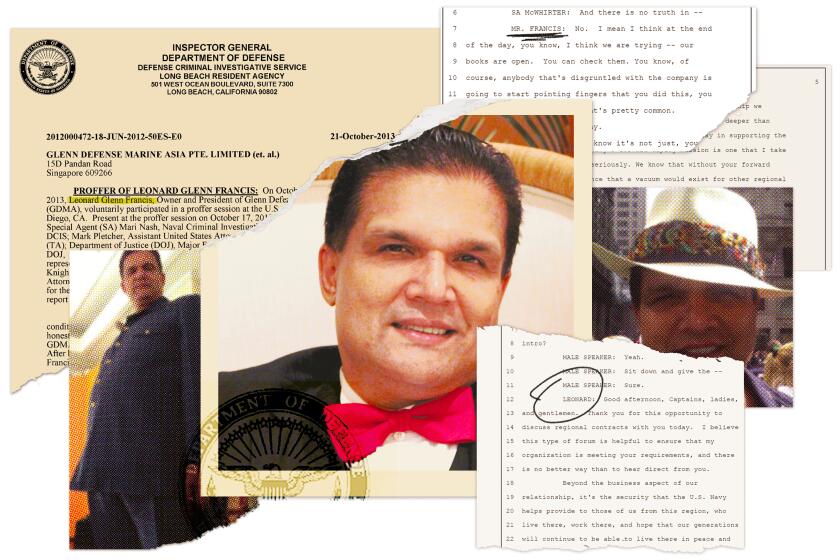Judicial watchdog issues ‘severe public censure’ against Judge Kreep, who remains on bench
The state judicial discipline agency issued a “severe public censure” against San Diego Superior Court Judge Gary Kreep on Thursday, stopping just short of removing him from the bench.
The punishment is the second most-serious that the Commission on Judicial Performance can assess against a judge. Kreep came close to losing his seat on the bench, with four of the 10 commissioners — including all three active judges who are part of the commission — voting for removal.
The commission leveled 29 charges of misconduct against Kreep, most of which related to his judicial campaign and his first year on the bench in the downtown San Diego Superior Court. Lawyers for the commission had argued he should be removed from office because the misconduct was so serious.
Despite the large number of violations the commissioners did not kick him off the bench, because it said in its decision that most of the violations occurred during his 2012 campaign for the seat and in his first year or so as a judge.
But the decision harshly rebuked him for his conduct, and how it damaged the perception of the court system.
“Judge Kreep has engaged in a pattern of misconduct that demonstrates a lack of judicial temperament” Richard Simpson, the vice chairman of the commission wrote. “During his campaign for judicial office he conducted himself in a manner that created an appearance of lack of impartiality and demonstrated a disregard for adhering to election laws and assuring the accuracy of his public representations. After taking office, he often ran his courtroom in a manner that was undignified and suggested bias or prejudgment.’
The 67-year-old Kreep, who is up for re-election next year, did not respond to a request for comment on the decision. His attorney James Murphy said the judge was traveling and would be relieved to know that the commissioners did not agree with the staff lawyers who sought his removal.
He said Kreep has listened to the criticism of his early conduct and taken in the advice from fellow judges on how to change his behavior and has become a productive judge since his rocky start.
“He’s looking forward to getting back to work and discharging his judicial duties,” Murphy said.
Kreep was elected to the bench by a narrow margin in 2012. He had spent decades as a prominent lawyer in conservative legal causes, and was perhaps best known for his work on “birther” lawsuits that challenged the citizenship of former President Barack Obama and his eligibility for office. The claims have been discredited and proven false.
The charges alleged that Kreep made a string of inappropriate comments to lawyers, litigants and court staff while on the bench, including some aimed at women attorneys with the San Diego County Public Defender’s Office and San Diego City Attorney’s Office. He commented on their appearance, ethnicity, and used nicknames to refer to them.
In one instance he commented on the accent of a Latina deputy Public Defender, then asked her if she was a Mexican citizen. When she said she was not, Kreep responded “I wasn’t planning on having you deported.”
He used nicknames for lawyers, including referring to one African-American woman lawyer as “Star Parker,” an African-American celebrity. The lawyer testified at a hearing on the charges in February the nickname made her uncomfortable and was not flattering.
Another lawyer was dubbed “Bun Head.” a second “Ms. Dimples,” and a 6-foot-7-inch male lawyer Kreep called “Shorty.” The comments showed a lack of decorum and could “undermine confidence in the judiciary.”
Kreep’s fraught relationship with the City Attorney’s office was the basis of the most serious charge against him of willful misconduct. The office was both upset about his decision in some cases and his use of nicknames and other comments he made to city lawyers.
In September 2013, the office instituted a “blanket challenge” on Kreep. That is a tactic where prosecutors can boycott a judge’s courtroom from getting new cases. It generally results with the court quietly reassigning the judge for a period of time to another courtroom.

Watchdog Minute: Complaint against Kreep
Kreep reacted angrily when informed of the challenge and told that he was being sent to Traffic Court. He told some public defenders in his downtown San Diego courtroom during a break, “If they are coming for me, they are likely coming for you, “ according to the report.
The commission said that Kreep improperly expressed “hostility” to the challenge, a violation of judicial ethics, and he had “no legitimate reason” to comment on it.
The commission also contended Kreep misrepresented his role in three organizations on his campaign website during his 2012 campaign for the bench, and violated judicial rules by engaging in political campaigning for a nonjudicial office when he solicited support and money opposing President Barack Obama’s re-election.
Len Simon, a San Diego lawyer who was among a group 16 people who filed a complaint with the commission in 2013 over his campaign activity, welcomed the decision.
“I’m pleased they found he acted improperly,” he said. “I would have thought the proper remedy was removal given the number of counts of wrongdoing they found he had committed. But, he’ll have to face the voters if he wants to stay on the bench much longer.”
For the past several years, Kreep has been assigned to a courtroom dealing largely with landlord-tenant disputes. The commission credited him with working hard in that courtroom and earning plaudits from lawyers who appear before him.
Twitter: @gregmoran
The latest news, as soon as it breaks.
Get our email alerts straight to your inbox.
You may occasionally receive promotional content from the San Diego Union-Tribune.







